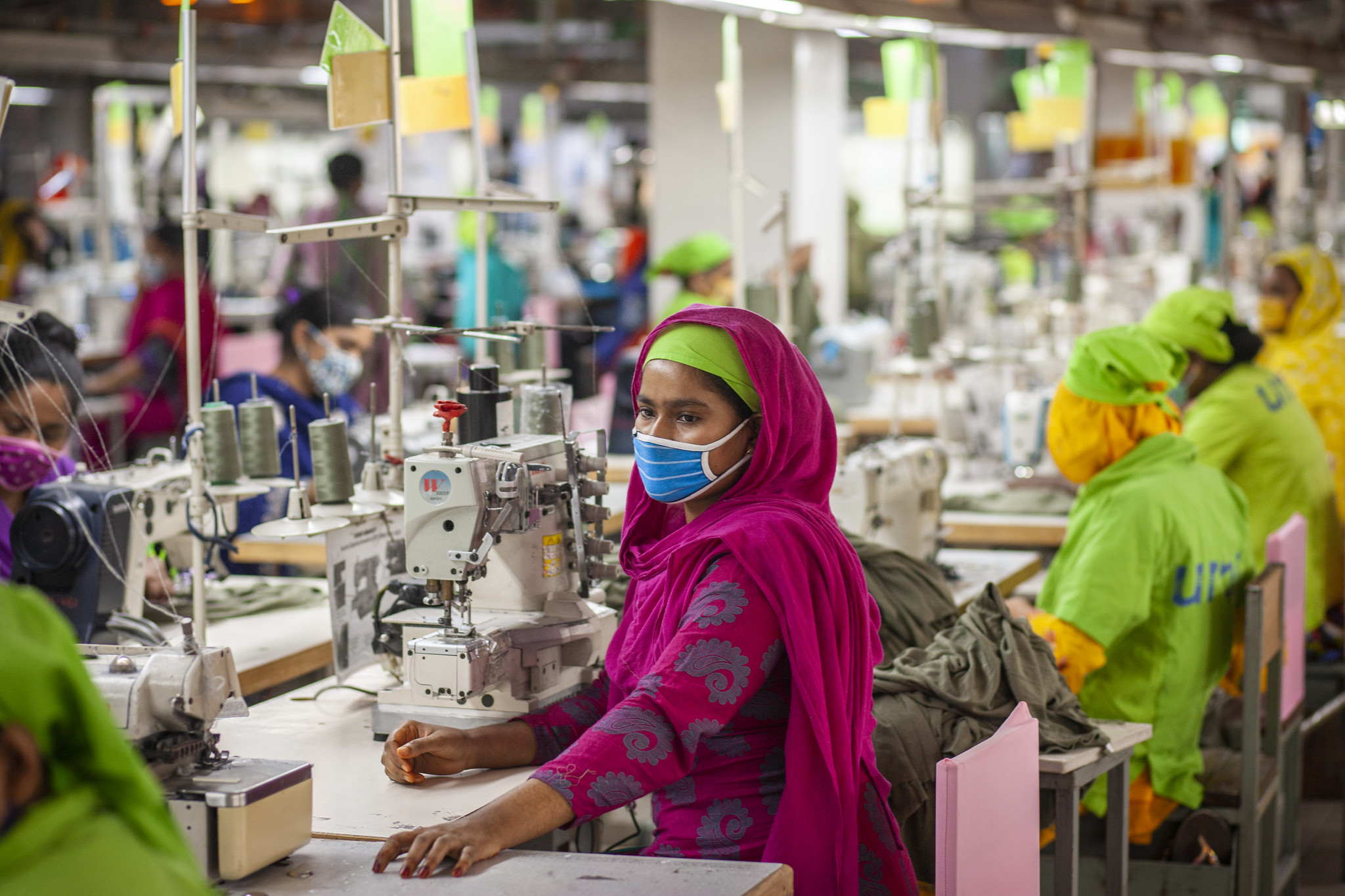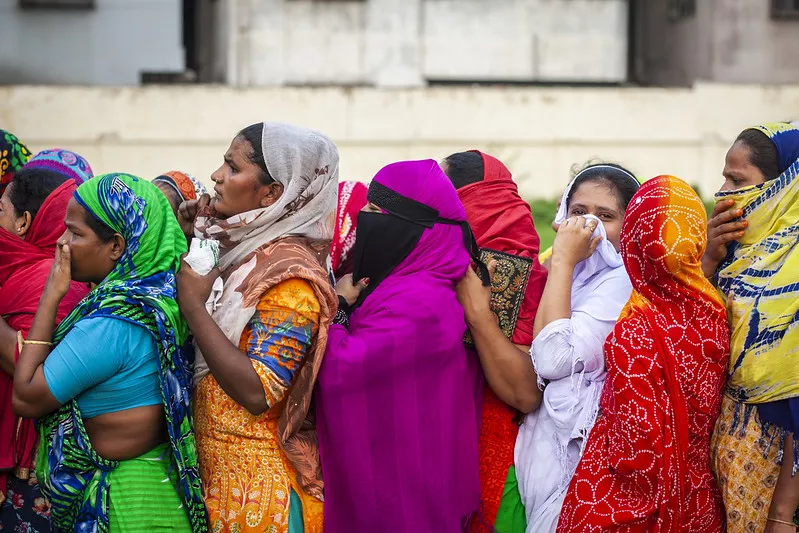Knowledge, power, and change in poly crisis: what can we learn from Bangladesh for the world?
The Covid-19 Learning, Evidence and Research Programme in Bangladesh (CLEAR) set out with the explicit aim to generate policy-relevant research and evidence to support Covid-19 recovery.
As the two and half year programme comes to an end CLEAR is organising a final conference to share key findings from CLEAR grantees and explore how lessons emerging from the programme might help to increase resilience in the face of future shocks. The aim is to contribute to a future knowledge agenda for Bangladesh that connects local concerns to the global priorities and debates in development. We also hope to generate broader lessons on how to foster research and knowledge partnerships to generate actionable evidence during and after periods of crisis.
The conference will bring together CLEAR grantees and advisory board members; relevant Bangladesh based academics, selected donors, CSOs, INGOs and government policymakers.
- 3rd to 5th March 2024
- Bangladesh Investment Development Authority (BIDA) , Dhaka
- Register for the livestream of opening and closing plenary sessions
- Sign up for updates on CLEAR
Agenda
The conference will consist of opening and closing plenaries plus six thematic sessions that will draw on the work of CLEAR grantees.
Moderator: Dr Sohela Nazneen, IDS
Panellists:
- Asif Saleh, Executive Director, BRAC Bangladesh
- Barrister Sara Hossain, Senior Advocate, Supreme Court of Bangladesh
- Professor Naomi Hossain, Professor of Development Studies, SOAS, University of London
- Professor Mustafizur Rahman, Distinguished Fellow, Centre for Policy Dialogue (CPD)
- Professor Peter Taylor, Director of Research, IDS
- Anir Chowdhury, Policy Advisor, Aspire to Innovate (a2i) programme of the Government of Bangladesh
This interactive session will gather views from different actors on the role knowledge plays in crisis and its aftermath. Knowledge generated during the pandemic–peak–period focused on monitoring and mitigating the impact of crisis in the short term. Did these efforts last? What has changed in the way we produce knowledge to understand and manage crisis? What were the missed opportunities? What were the methodological innovations for gathering rapid and reliable data and good enough analysis? What kind of knowledge ‘counted’ as evidence to the policy makers? What practices shifted in knowledge generation? Did this lead to systemic change in the aftermath?
Chair: Dr. Zulfikar Ali, Senior Research Fellow, BIDS
Panellists:
- Dr Upasak Das, Presidential Fellow, Global Development Institute, University of Manchester, presenting on CLEAR grant ‘multidimensional poverty’
- Dr Keetie Roelen, Senior Research Fellow, Open University, presenting on CLEAR grant for ‘becoming poor’
- Dr Kate Pruce, Research Fellow, Rural Futures Cluster, IDS, presenting a synthesis from all CLEAR grants on ‘social protection and global agenda’
Discussant(s):
- Md Fazlul Kader, Additional Managing Director , Palli Karma-Sahayak Foundation (PKSF)
- Mohammad Jahirul Quayum, Joint Secretary, Ministry of Finance
The economic and health shocks triggered by the pandemic and the current cost-of-living crisis meant the poor experienced multiple vulnerabilities. Their coping strategies were varied. What kinds of coping strategies were used? What are the new dimensions of vulnerabilities that have emerged, for example, the psychosocial impact of poverty on the new poor? What could be the knowledge agenda regarding multiple crisis and coping? Social protection was expanded to address these vulnerabilities. What kinds of thinking have emerged around building a shock responsive social protection system?
Further reading:
Read the CLEAR Synthesis Report 2: Innovations and Challenges in Crisis Contexts: Bangladesh’s Social Protection Response to the Covid-19 Pandemic
Read the CLEAR Synthesis report 3: Multiple Crises, Coping Strategies, and their Longer-Term Impacts
Chair: Mehnaz Rabbani, Director, Operations, Strategy, and Partnership, BIGD
Panellists:
- Dr Farzana Misha, Assistant Professor, BRAC James P. Grant School of Public Health (BRAC JPGSPH), presenting on CLEAR grant for ‘digital health apps’
- Dr Ipshita Basu, University of Westminster and Professor Joe Devine, Associate Pro-Vice Chancellor, University of Bath presenting on ‘union digital centres and citizen’s access’
- Kevin Hernandez, Research Officer, Digital Cluster, IDS presenting a synthesis from all CLEAR grants on ‘digitalisation and the global knowledge agenda’
Discussant: Anir Chowdhury, Policy Advisor, a2i
Covid–19 led to the expansion of digital services– both apps and platforms for citizens to access services. The pandemic also provided an opportunity to test how digitalisation addresses information and access gaps and whether it helps to bypass other barriers that citizens face. The digitalisation of services had a mixed impact during the pandemic period. Will the various changes that were implemented last? Discussion here will focus on the role played by power and social dimensions to make the promise of the digital work.
Further reading:
Read the CLEAR Synthesis Report 1: Digitalisation of State Services in Bangladesh
Chair: Safiqul Islam, Former Director of Education, BRAC
Panellists:
- Dr Shaila Ahmed, Assistant Professor and Research Fellow, BIGD, presenting the ‘ASER pilot study on learning loss’
- Mohammad Abdul Quddus, Co-Researcher, CAMPE, presenting on Education Watch 2023
Long school closures and a lack of effective digital platforms have led to a deep learning loss in Bangladesh. While the state took some measures to deliver education to children these were not effective. What has been the extent of this loss? How do we measure this loss? Are the current responses adequate to address this gap? Were there innovations in the field that can be scaled up? How do we prepare for the next shock? The session will also focus on why the debate and collective mobilisation by parents were limited and what impact it had on the government in addressing learning loss.
Chair: Professor Rounaq Jahan, Distinguished Fellow, Centre for Policy Dialogue, CLEAR Advisory Board
Panellists:
- Professor Naomi Hossain, SOAS, and Professor Shuvra Chowdhury, University of Rajshahi, presenting on ‘Feedback State: Mechanisms set up by the government and citizen response’
- Dr Miguel Loureiro, Research Fellow, Governance IDS presenting on ‘Durdiner Diaries: How the new poor cope and governance implications of their strategies’
- Professor Asif Shahan, Associate Professor, University of Dhaka, presenting on ‘questions of autonomy at the local level in managing crisis’
Discussant:
- Dr Manzoor Hasan, OBE, Executive Director, Centre for Peace and Justice (CPJ), BRAC University
- N M Zeaul Alam, PAA, Former Senior Secretary of the Information and Communication Technology Division
The Covid-19 pandemic changed the dynamic of state-citizen engagement in Bangladesh. These changes were triggered by the digitalisation of citizen engagement at the local level for registering grievances, changes to the autonomy of local government and the shifting space available for NGOs, as actors facilitating citizen engagement, to hold the state to account. Are there new entry points for citizen engagement at the local level and sustaining democratic practices? What are the implications for accountability?
Further reading:
Read the CLEAR Synthesis report 4: Accountability and Citizen–State Relations in Bangladesh: Findings from the CLEAR Programme
Moderators:
- Dr Sohela Nazneen, IDS
- Professor David Hulme, University of Manchester
Panellists:
- Maheen Sultan, Senior Fellow of Practice and Head of Gender and Social Development Cluster, BIGD, presenting on ‘exclusions based on gendered barriers and experience of women in urban settlement’
- Iffat Jahan Antara, Senior Research Associate, BIGD, presenting on ‘violence against women during the pandemic and measures to tackle the issue’
- Dr Fahmida Tofail, Scientist and Senior Consultant Physician, ICDDR, B, presenting on ‘exclusions for urban settlement residents and accessing vaccination and its impact on children’
- Syeda Salina Aziz, Fellow of Practice, BIGD, presenting on ‘how gender norms influence coping strategies’
- Professor Shahaduz Zaman, Professor of Medical Anthropology and Global Health, University of Sussex presenting on ‘community governance’
Discussants:
- Md Fozlul Hoque, Senior Advisor, Sajida Foundation
- Sufia Nazim, Joint Secretary, Ministry of Women and Children Affairs
The pandemic affected women and girls deeply. Their access to sexual and reproductive health services were disrupted, domestic violence increased, and women and girls also bore the brunt of poverty. The aftermath of Covid -19 saw women and girls falling behind in economic participation and education. Urban poor women perhaps suffered the most. How did gender feature in our work? Cities have emerged as spaces demanding particular attention during and in the post pandemic period. The urban poor are disenfranchised. Urban services and social protection were inadequate. These gaps had a deep impact on marginalised urban populations during the pandemic. What role did municipal government and systems of urban governance play in this regard? This moderated discussion session will highlight what we found on these issues and what this means for tackling the future shocks.
Moderators:
- Dr Adnan Fakir, Lecturer in Economics, University of Sussex
- Tahmid Hassan, Associate, BIGD, and Program Coordinator, Pashe Achi Initiative
During Covid-19, the youth engaged in mitigating the effect of the pandemic in different ways. We saw the use of digital platforms for information exchange. The youth initiated and participated in voluntary work. We also saw the emergence of techno activism. This interactive session brings together youth activists to discuss what they did, how they did things and what they think about spaces for engagement in the future.
Moderator: Dr Selim Jahan, former Director of the Human Development Report Office (HDRO) of the United Nations Development Programme (UNDP)
Panellists:
- Professor Rounaq Jahan, Distinguished Fellow, Centre for Policy Dialogue, CLEAR Advisory Board
- Professor David Hulme, University of Manchester
- Rasheda K Choudhury, Member, CPD Board of Trustees; Executive Director, CAMPE; and Former Advisor to the Caretaker Government
- Dr Hossain Zillur Rahman, Executive Director, PPRC and Former Advisor to the Caretaker Government
- Dr S R Osmani, Professor of Development Economics at the University of Ulster
- Dr Sohela Nazneen, Senior Fellow, IDS
- Dr Imran Matin, Executive Director, BIGD
Closing remarks: Matt Cannell, Deputy High Commissioner and Development Director, British High Commission
This is forward-looking session will have panellists reflecting on: what facilitates knowledge innovation and eco-systems that help to prepare us for future shocks. They will be asked to reflect on what kind of data governance systems do we need? How do we respond better to crisis? What kinds of partnerships and funding help facilitate the production of knowledge to build forward better?


